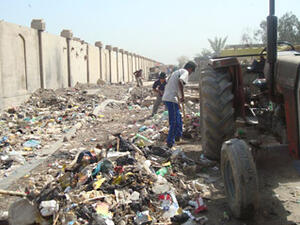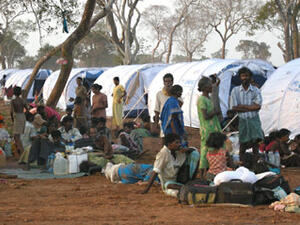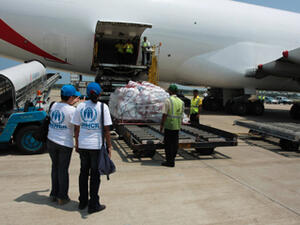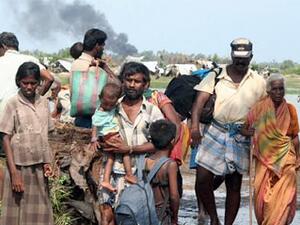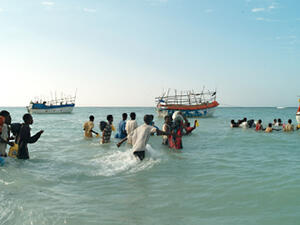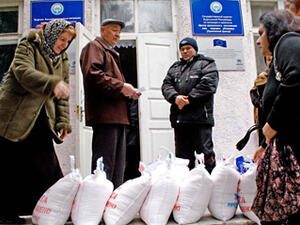Armed men on horseback extend attacks on villages in eastern Chad
Armed men on horseback extend attacks on villages in eastern Chad

Driving their donkeys before them, two villagers flee towards the security of a site for displaced people in Habile, near Koukou.
HABILE, Chad, November 10 (UNHCR) - The UN refugee agency and its partners have found evidence that armed men on horseback have extended their attacks on villages in eastern Chad.
On Thursday, an inter-agency mission travelled to the Koukou region, south-east of the town of Goz Beida, and found a pattern of burned villages similar to that found earlier in the Kerfi area, south-west of Goz Beida.
"We remain extremely concerned about the deteriorating security situation in the region and the effect it might have on our humanitarian operation," UNHCR spokesman William Spindler told reporters in Geneva on Friday.
The inter-agency mission, including representatives from UNHCR, visited Louboutigue village, some 35 kilometres from Goz Beida, and found it had been attacked on Wednesday morning and burned to the ground.
The previous day, the villagers had heard shooting in Djorlo village and decided to leave Louboutigue. They fled towards a site for displaced people at Habile, about 10 km away. "We decided to leave because we knew it would be our turn soon. We took our belongings with us and our animals," said one of the villagers.
Vulnerable people, such as the elderly, hid in the bush. Some are still in hiding. "We were completely overtaken by the attack, they burned down everything, there is nothing left. They started attacking on Wednesday at 10 in the morning," said another villager from Louboutigue.
On the road from Louboutigue to Habile, the joint mission saw dozens of people fleeing with their belongings - their donkeys carrying bags of food supplies. Some people were also bringing their livestock.
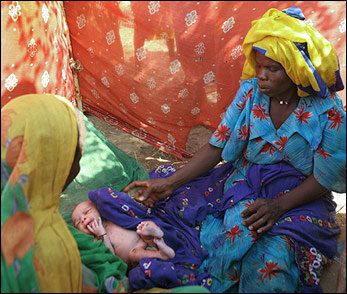
One of the displaced villagers has just given birth to a baby girl under a colourful makeshift shelter in Habile.
In Habile, new arrivals have started building makeshift shelters. The site already hosts 3,500 persons from earlier displacements and has reached its maximum capacity. UNHCR is discussing with the authorities to find a temporary site for the new arrivals.
"Most newly displaced told us that they want to return as soon as possible to their land as the harvesting season is starting. However, they said they would only return if they felt secure," UNHCR's Spindler said, adding: "The displaced people told us that many other villages have been attacked including Abondy, Kreta, Am Haraz, Dourty and Djami la-Assit."
UNHCR is providing basic assistance to those arriving in Habile, including plastic sheeting, mats, blankets and medicine, and is looking at increasing the number of water points.
In the Kerfi area, attacks have also taken place in recent days. Tamadjour village, 35km south of Kerfi village was attacked, sacked and burned on Wednesday morning by what villagers described as Arabs on horses. There are initial reports that two people were killed and four wounded. The wounded were evacuated on Thursday morning to Goz Beida hospital.
An estimated 300 people are displaced from Tamadjour and have gathered by several water points near Djabal refugee camp - which hosts 15,000 refugees from Sudan's troubled Darfur region.
Initial reports indicate that inhabitants from Abshour and Sanour villages are also fleeing towards Goz Beida. UNHCR is in contact with the chief of canton in Goz Beida in order to find an additional site for the new arrivals. The town is already hosting 11,000 people who started to arrive last March following attacks near the Chad-Sudan border.
UNHCR personnel on Thursday met Sudanese refugee leaders from Goz Amir camp, some 10 km from Koukou village, who said they felt exposed and very insecure after the latest attacks.
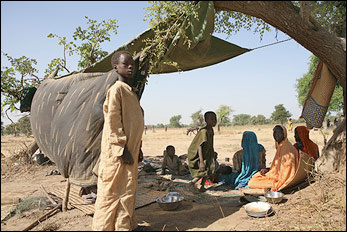
A group of women and children gather under their makeshift shelter in Habile. They fled their village fearing that it was about to be attacked.
Minimum military reinforcements are just starting to arrive now in the Goz Beida area to secure the refugee camp areas, but UNHCR believes more needs to be done. "We continue to support the idea of a rapid deployment of an international presence in the region to improve the security for humanitarian workers, refugees and the local population," said Serge Male, UNHCR representative in Chad
There are an estimated 63,000 internally displaced people in eastern Chad. UNHCR and its partners assist 218,000 refugees from Darfur in 12 camps in eastern Chad.
By Hélène Caux in Habile, Chad




